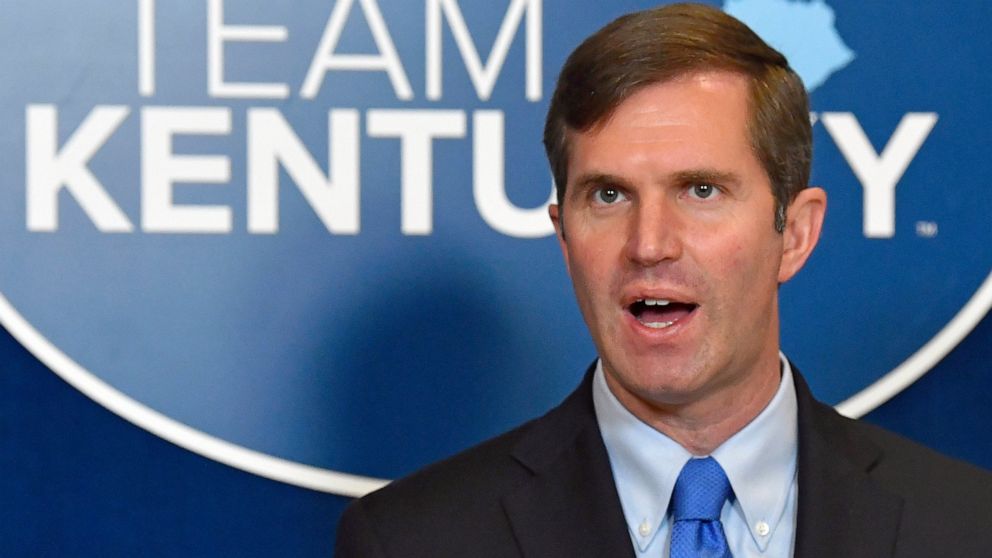
FRANKFORT, Ky. – The Kentucky governor’s efforts to aggressively combat COVID-19 suffered a legal defeat on Saturday when the state high court paved the way for new laws to restrict its emergency powers.
In a major separation of powers, the Kentucky Supreme Court said the legislature exercises authority to make policies to limit the emergency powers granted to the governor by state law.
The ruling ordered a lower court to dissolve a court order that for months had blocked Republican-backed laws to curb the executive authority of Democratic Gov. Andy Beshear.
The order could dramatically alter the state’s response to the pandemic at a time when virus cases and hospitalizations have increased due to the highly contagious delta variant.
The governor’s office quickly warned of the impact. The Supreme Court order will dissolve the state of emergency related to the Kentucky pandemic, Beshear spokesman Crystal Staley said Saturday. The next step is to determine whether lawmakers are willing to extend the state of emergency in a possible special session, he said.
“The governor has had the courage to make unpopular decisions to keep Kentuckians safe,” Staley said in a statement. “The court has eliminated much of its ability to do so to move forward. If a special session is convened, we expect the General Assembly to do the right thing.”
According to the latest statistics reported by researchers at Johns Hopkins University, Kentucky has so far seen 7,517 deaths related to COVID-19, the 27th highest mortality rate in the country and the 30th highest per capita. The overall rate was lower than some of its neighboring states.
Leading Republican Party legislative leaders hailed the ruling in recognition of the legislature’s “constitutional authority to enact laws.” In a joint statement, House Speaker David Osborne and Senate President Robert Stivers said lawmakers “are ready to work with the governor, as we have done for nearly a year and a half, and address which is a very real public health crisis. “
Republican Attorney General Daniel Cameron, who defended the new laws, urged Beshear to consult with lawmakers to “find consensus on what is needed to protect Kentuckians.”
The Supreme Court weighed in with its rare ruling on Saturday. The judges said “we do not question the good faith of the governor” in taking the measures he deemed necessary to deal with the pandemic. But they said the governor’s claims that the measures impaired his ability to perform his constitutional functions were “largely unsupported by sound legal principles.”
“In summary, given that the impugned legislation was lawfully passed, the governor’s complaint does not raise a substantial legal issue that would need to maintain the effectiveness of the legislation,” Judge Laurance B. VanMeter wrote.
The verdict returned the case to the Franklin Circuit with instructions to dissolve the warrant.
One of the contested laws limits the governor’s executive orders in emergencies to 30 days, unless legislators extend them. According to another measure, businesses and schools must comply with the governor’s COVID-19 guidelines or the Federal Centers for Disease Control and Prevention. They could follow the less restrictive standard.
In a concurring opinion, Deputy Chief Justice Lisabeth T. Hughes said the 30-day limit on a governor’s emergency authority deserves a lower court legal review when the case is returned.
“The 30-day limit works like a ‘death switch’ that basically transfers day-to-day emergency management to the legislature, leaving the executive powerless to act after 30 days, forcing the convening of a special legislative session.” she wrote. “This kind of activation of special legislative sessions has no background in Kentucky law as far as I know and requires careful constitutional analysis.”
Chief Justice John D. Minton Jr. joined the concordant opinion.
Republican lawmakers said the new laws were intended to test what they considered an extension of Beshear to order the restrictions. The governor maintained the steps he took to limit activity during the pandemic to save lives.
The governor lifted most of his restrictions in June. But with COVID-19 cases and increasing hospitalizations, he recently signed an executive order imposing an inner mask warrant on K-12 schools, child care and preschool programs throughout Kentucky.
The governor’s spokeswoman noted the far-reaching impact of dissolving the state of emergency related to the Kentucky pandemic.
“Eliminates or puts at risk large amounts of funding, measures we have taken to increase our capacity for health care, expansion of meals for children and families, measures to combat COVID-19 in long-term care centers, compensation of front-line worker workers who hire COVID-19, as well as the ability to fight falling prices, “Staley said.” It will further prevent the governor from taking additional measures, such as a general mask mandate. “
Beshear resisted criticism and occasional protests over his pandemic-related actions. Armed protesters gathered near the governor’s house last year and then hung Beshear in an effigy on a tree near the state Capitol.
Last year, the state Supreme Court upheld the governor’s authority to issue coronavirus-related restrictions on businesses and individuals. The legislature responded by passing new laws this year.
———
Follow more of the AP pandemic coverage at https://apnews.com/hub/coronavirus-pandemic